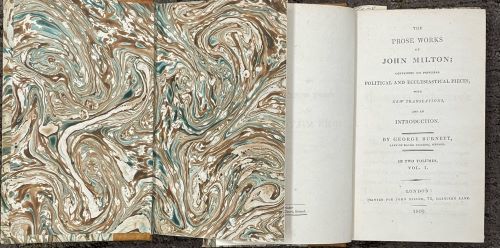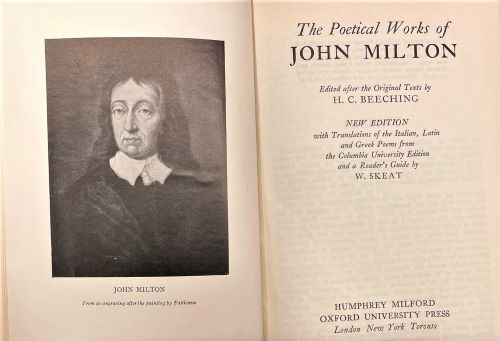Given that today is the birthday of one of the greatest writers of English prose and poetry, John Milton, I pulled a few of Milton's works from the shelves of Pierre Goodrich's collection in Liberty Fund's rare book room. The first thing that seems to me to be worthy of note here is that Goodrich owned both Milton's prose and his poetry. it's easy to lose sight of Goodrich's commitment to and interest in literature because of his strong interest in economics, politics, and philosophy--but his library contains plenty of well chosen and well-read fiction and poetry as well.
The Reading Room
Milton’s Poetry and Prose: From the Liberty Fund Rare Book Room
 The 1809 two volume edition of Milton's prose is definitely the more stunning of the books. Its gold stamped calf covers open to reveal more of those marbled end papers that are always a delight to find, and the precisely printed text inside is clear and easily readable despite the small print.But Goodrich left Milton's prose works almost unmarked. The interior of the poetry volume, however, is another matter.
The 1809 two volume edition of Milton's prose is definitely the more stunning of the books. Its gold stamped calf covers open to reveal more of those marbled end papers that are always a delight to find, and the precisely printed text inside is clear and easily readable despite the small print.But Goodrich left Milton's prose works almost unmarked. The interior of the poetry volume, however, is another matter. 
The unprepossessing frontispiece portrait and title page aren't terribly promising, but Goodrich clearly found the contents compelling. The text is marked throughout in pencil with brackets and underlining, and contains a host of comments by Goodrich--many of which I was unable to decipher. One of these, however, reminded me of the marginal moment I came across in Goodrich's copy of The Screwtape Letters, where he connected the text to the Bhagavad Gita. Here, Goodrich reads the description of the demonic eloquence of Belial when he addresses the fallen angels in hell:
A fairer person lost not Heaven; he seemed For dignity composed, and high exploit.
But all was false and hollow; though his tongue
Dropped manna, and could make the worse appear
The better reason...
 Goodich underlines the last two lines and, in the margin, simply notes, "Gorgias."
Goodich underlines the last two lines and, in the margin, simply notes, "Gorgias." It's clearly a reference to Plato's great dialogue Gorgias, which tangles with (among other things) the complicated ethical question of what it means to be a good rhetorician. Perhaps Goodrich was thinking of passages such as this?
And the same will be true of the orator and the oratory in relation to all other arts. The orator need have no knowledge of the truth about thongs; it is enough for him to have discovered a knack of persuading the ignorant that he seems to know more than the experts.
Comments:
Walter Donway
Very insightful. Takes us back to the glorious day when poetry dealt with philosophy, politics, and history. No wonder Goodrich focused on Milton's poetry. In our day, virtually all poetry is in the form of the lyric--a brief, emotional statement intended to accompany the lyre. The longer forms such as epic, satire, drama, lyrical ballad, and sestina are virtually lost arts. They are much more demanding of craft and thought than the lyric; I know, I have tried them. I had to scuttle to Google to see what Plato meant by "thongs." (No I did not think THAT.) Turns out he was referring to the leather straps with which boxers from Sparta bound their hands. The controversy was over using hardened and sharp-edge leather, making blow more damaging. Kind of like brass knuckles.